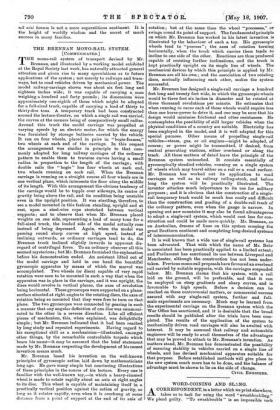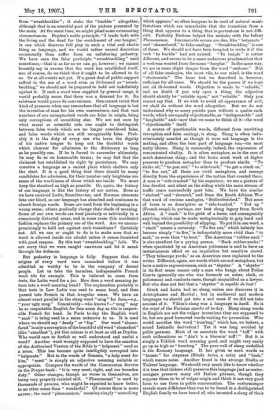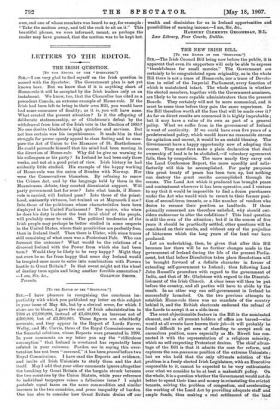WORD-COINING AND SLANG.
ACORRESPONDENT, in a letter which we print elsewhere, takes us to teak for using the word " swashbuckling." We plead guilty. "To swashbuckle " is an impossible verb
from " swashbuckler" ; it sinks the " buckler " altogether, although that is an essential part of the picture presented by the noun. At the same time, we might plead some extenuating circumstances. Dryden's noble principle, "I trade both with the living and the dead for the enrichment of our tongue," is one which deserves full play in such a vital and elastic thing as language, and we would rather exceed discretion occasionally than suffer from an unfaltering pedantry. We have seen the false participle " swashbuckling " used sometimes,—that is as far as we can go, however ;' we cannot honestly say in excuse that the word has established itself, nor, of course, do we think that it ought to be allowed to do so. Or at all events not yet. If a great deal of public support rallied to the use of a word even as ill-formed as "swashbuckling," we should not be prepared to hold out indefinitely against it. If such a word were supplied by general usage, it would probably mean that there was a demand ' for it. Its existence would prove its convenience. One cannot resist that kind of pressure when one remembers that all language is but the invention of man for his own convenience, and that vast numbers of our unimpeached words are false in origin, being only corruptions of something else. We are not sure by what moral or scientific rule one ought to distinguish between false words which are no longer considered false, and false words which are still recognisably false. Probably it is the duty of every one who loves the dignity of his native tongue to keep out the doubtful words which clamour for admission to the dictionary as long as he possibly can. If he is forced to surrender ultimately, he may do so on honourable terms ; be may feel that the claimant has established its right by persistence. We may conceive a language as a sacred place which shelters only the elect. It is a good thing that there should be many candidates for admission, for their number only heightens our sense of the worthiness of those which are inside. We must keep the standard as high as possible. Or, again, the history of our language is like the history of our nation. Even as we have received Latin, Scandinavian, and Norman elements into our blood, so our language has absorbed and continues to absorb foreign words. Some are used froth the beginning in a wrong sense; others gradually change their shade of meaning. Some of our own words are used jocularly or satirically in a consciously distorted sense, and in some cases this accidental fashion replaces the primary use of the word. Are we uncompromisingly to hold out against such transitions ? Certainly not. All we can or ought to do is to make sure that no word is allowed inside our citadel unless it comes furnished with good reasons. By this test " swashbuckling " fails. We are sorry that we were caught unawares and let it sneak through the defences.
• But pedantry in language is folly. Suppose that the .origins of every word were ransacked before it was admitted as worthy to be in the company of decent people. Let us take the harmless, indispensable French word tile for example. This is believed to come from testa, the Latin word for a jar. Row does a word meaning jar turn into a word meaning head? The explanation probably is that testa in Low Latin was used to mean head, and thus passed into French in that irregular sense. We have an almost exact parallel in the slang word " mug " for face,--e.g., "your ugly mug." Conceivably—who knows P—" mug" may be as respectable' English for face some day as tile is respectable French for head. In Paris to-day the English word " snob " is being used in a sense unknown to IN. It is used where we should say " dandy " or "fop." Our word "shamefaced" is only a corruption of the beautiful old word "shamefast" (like "steadfast "), yet this misuse is at least as old as Dryden. Who would care to forfeit so well understood and useful a word ? Another word wrongly supposed to have the sanction of the Authorised Version of the Bible is " helpmeet " used as a noun. This has become quite intelligibly corrupted into "helpmate." But in the words of Genesis, "a help meet for him," "meet" is simply an adjective meaning suitable or appropriate. Compare the words of the Communion Service in the Prayer-book : "it is very meet, right, and our bounden duty." Other changes, though no worse in themselves, are being very properly resisted still. "Phenomenal" is used by thousands of persons, who might be expected to know better, in no other sense than " wonderful." Of course there is some excuse ; the word "phenomenon," meaning simply " something
which appears," so often happens to be used of natural manifestations which are remarkable that the transition from a thing that appears to a thing that is portentous is not difficult. Probably Dickens helped the mistake with the Infant Phenomenon. Innumerable errors are due, like " helpmate " and "shamefaced," to false analogy. " Swashbuckling " is one of these. We should not have been tempted to write it if the verb "to buckle" had not existed. "To burgle" is rather different, and seems to be a more audacious proclamation that a verb was wanted from the noun "burglar." In the same way, we are in some slight danger from the word "enthuse." But of all false analogies, the most vile, to our mind, is the word "electrocute." The loose test we described is, however, sufficient for all cases. We should be the poorer if we kept out all ill-formed words. Objection is made to "reliable," and no doubt if you rely upon a thing, the adjective should strictly be "reliable upon," not "reliable." Only you cannot say that. If we wish to avoid all appearance of evil, we shall do without the word altogether. But we do not understand why so many purists pass without a qualm such words, which are equally objectionable, as "indispensable" and "laughable" and—now that we come to think of it—the word " objectionable " itself.
A source of questionable words, different from unwitting corruption and false analogy, is slang. Slang is often indiscriminately assailed as though it were not language in the making, and often the best part of language too,—its mast nutty idioms. Slang is commonly, indeed, the expression of concentrated vitality. It is often metaphor, as in the case of much American slang; and the brain must work at higher pressure to 'produce metaphor than to produce simile. "To strike oil," "to pan out," "to side-track," "to get a cinch on," "to fire out" all these are vivid metaphors, and emerge directly from the experiences of the nation that created them. A man is "side-tracked" by his superiors; we see a picture of him derelict and silent on the siding while the main stream of traffic roars successfully past him. We have the similar " shelved " and "shunted," and from the South African War that word of curious analogies, " Stellenbosched." 'But none of these is so descriptive as "side-tracked." "Fed up " (French wake) is, perhaps, our best slang legacy from South Africa. A "cinch" is the girth of a horse, and consequently anything which can be made metaphorically to grip hard and well beyond the possibility of slipping. To put lain one word, a "cinch" means a certainty. "To fire out," which latterly has become simply "to fire," is indisputably more vivid than "to sack," or even than "to boot." The American " rubber-neck " is also excellent for a prying person. "Back rubber-necks!" when ejaculated by an American policeman is said to have an instantaneous effect on an inquisitive but sensitive crowd. "They telescope yards," as an American once explained to the writer. Different, again, are words which are not metaphors, but have a native expressiveness, such as "shyster." A " shyster " in its first sense means only a man who hangs about Police Courts (generally one who was formerly an usher, clerk, or policeman) and conducts cases, though unqualified as a lawyer. But who does not feel that a "shyster" is capable de tout ?
Greek and Latin had no slang, unless one discovers it in Aristophanes and Martial ; but in mediaeval and modern languages we should get into a sad mess if we did not take account of it. Villon's slang was a language in itself. So is the argot of the Parisian apache of to-day. Many slang words in English are not the vulgar inventions they are supposed to be, but are good borrowed words waiting for promotion. Who would sacrifice the word " humbug," which has, we believe, a sound Icelandic derivation ? Yet it was long avoided by polite persons. Most of us associate the word " toff " with such collocations as " Ain't 'e a bloomin' toff !" But it is simply a Yiddish word meaning good, and might very easily go up as high as " humbug." The pure well of slang undefiled is the Romany language. It has given us such words as "tanner" for sixpence (Hindu taino, a coin) and "bosh," which means noise. Another fount is the strange Shelta or Tinkers' language. We should very much like to know whether it is true that tinkers still preserve this language just as costarmongers preserve many old Italian phrases, though they suppose them to be of vulgar origin and think it not very good form to use them in polite conversation. The costermonger reveals more diffidence than was to be found in a distinguished English family we have heard of, who invented a slang of their
own, and one of whose members was heard to say, for example: "Take the mutton away, and tell the cook to sit on it." This beautiful phrase, we were informed, meant, as perhaps the reader may have guessed, that the mutton was to be kept hot.








































 Previous page
Previous page